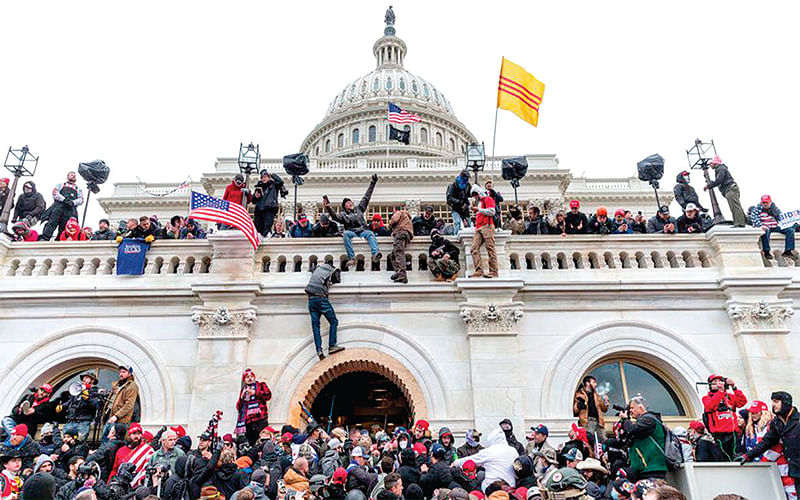For many Americans the trauma of the events of January 6 last year has not dissipated though a year has gone by. This is not surprising because the attack on the Capitol, the heart of American democracy, by a crowd of Donald Trump supporters was a demonstration that the world’s pre-eminent power was not immune to mobs running amuck, encouraged and provoked by an irresponsible leader. Never had the American political elite imagined that the country’s leading politicians, some of whom lecture the world generally on the virtues of democracy and specifically on the strength of America’s institutions, would have to cower in fear of rampaging hooligans who targeted guards—four of whom died— ransacked offices and bayed for the blood of Vice-President Mike Pence.
Soon after January 6 the leaders of the Democratic Party whose candidate Joe Biden won the Presidential election admitted that the day was one of the blackest in the country’s history. However, they stressed, as did some Republicans who were appalled at how far Trump had gone to turn electoral verdict, that the world’s focus should not only be on what had happened but the manner in which America would heal its wounds and become united and remain the shining star for global democracy. In his inaugural address on January 20 last year President Biden referring to the mob attack said “…on this hallowed ground where just days ago violence sought to shake this Capitol’s very foundation, we come together as one nation, under God, indivisible, to carry out the peaceful transfer of power as we have for more than two centuries”.
The transfer of power was finally ‘peaceful’ but hardly traditional. Not for a century and a half had an American President refused to attend his successor’s inaugural, but Trump did so. This was a culmination of his refusal to recognise Biden as the winner. He declared the election process in states where Biden had secured narrow and, in some cases, unanticipated victories as fraudulent. He urged his supporters to reject the vote too. He and his allies tried every judicial avenue, including appealing to the US Supreme Court, to overturn the election verdict. They failed. Finally, Trump pressured Pence who, under the constitution, was to preside over a joint session of both houses of the US Congress—the Senate and the House of Representatives—to certify the results. The certification has always been a formality but Trump wanted Pence to question the results of some states. That would have caused an unprecedented political and constitutional crisis. Pence refused to do Trump’s bidding. Pence was declared a traitor by many Republicans who continue to regard him so even now.
In his speech Biden said that Americans had gathered as one indivisible nation for the transfer of power but the fact is that the country he leads today is disunited and split. And, many Republicans are convinced that Trump was cheated out of victory. On his part Trump has kept this fiction alive. Indeed it was only at the last moment that he decided to call off a press conference he had scheduled for January 6 this year. While doing so he said “In light of the total bias and dishonesty of the January 6th Unselect Committee of Democrats, two Failed Republicans and the Fake News Media I am cancelling the January 6th Press Conference…”. Clearly, Trump continues to behave as he did before his election and during his term of office. He is brash and has a disdain for facts. But these characteristics appeal to his die-hard supporters for whom he can do no wrong. As his followers have not given up on him Republican politicians are wary of crossing his path.
Opinion polls show that Trump is by far the favourite, as of now, to be the Republican Party’s supporter’s Presidential candidate for 2024. Before that America will be going in for Congressional elections in November this year to elect one-third of the Senate and the House of Representatives. Will the events of January 6, 2021 play a role in the campaigns for the Congressional elections? In this context what Lloyd Green notes in a recent article in the Guardian is significant. Green holds “A majority of Republicans view the attack as a defence of freedom (56%) and just under half (47%) cast it as an act of patriotism”. He also states that about 16% of Americans including approximately 25% Republicans “approve” it. From this it would seem that January 6 events may not have as important a bearing on the overall approach of the American people on the Congressional elections as the Democratic Party hopes for. Certainly, the delays in the Congressional Committee’s proceedings on the events of January 6 have not been helpful in influencing America.
What the continuing divergence of opinion on the Capitol Hill attack also shows is that the fundamental divisions in American society and polity, which led to the rise of a polarising person like Trump to the pinnacle of American political power, are showing no sign of abating. The forces behind these fundamental differences derive from the pace and scope of transformations on account of technological change. Large numbers of people are simply unable to adapt to these changes. They fall easy prey to the rhetoric of demagogues like Trump who appeal to the vulnerable and the rootless in these uncertain times.
The return of a demagogue like Trump, perhaps Trump himself, to the White House is a serious and chilling and not an unthinkable prospect.
Disclaimer: The views and opinions expressed in this article are the personal opinions of the author. The facts, analysis, assumptions and perspective appearing in the article do not reflect the views of GK.







